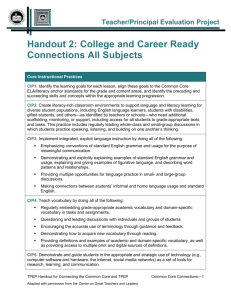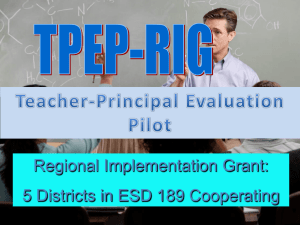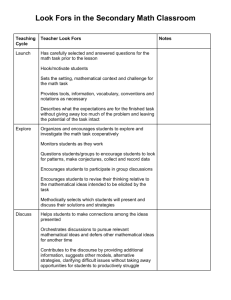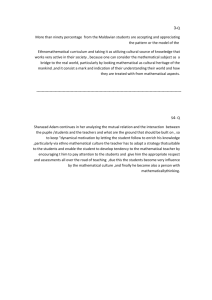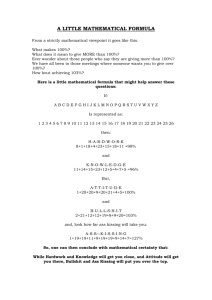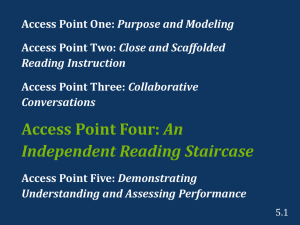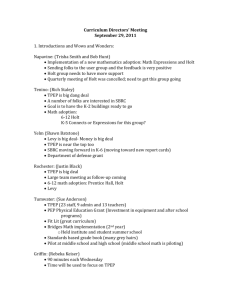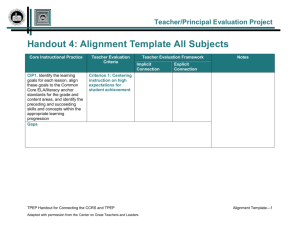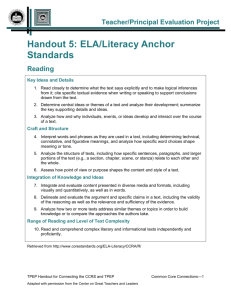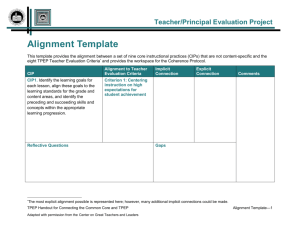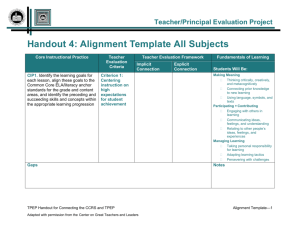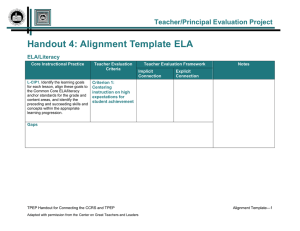Word - Washington State Teacher/Principal Evaluation Program
advertisement
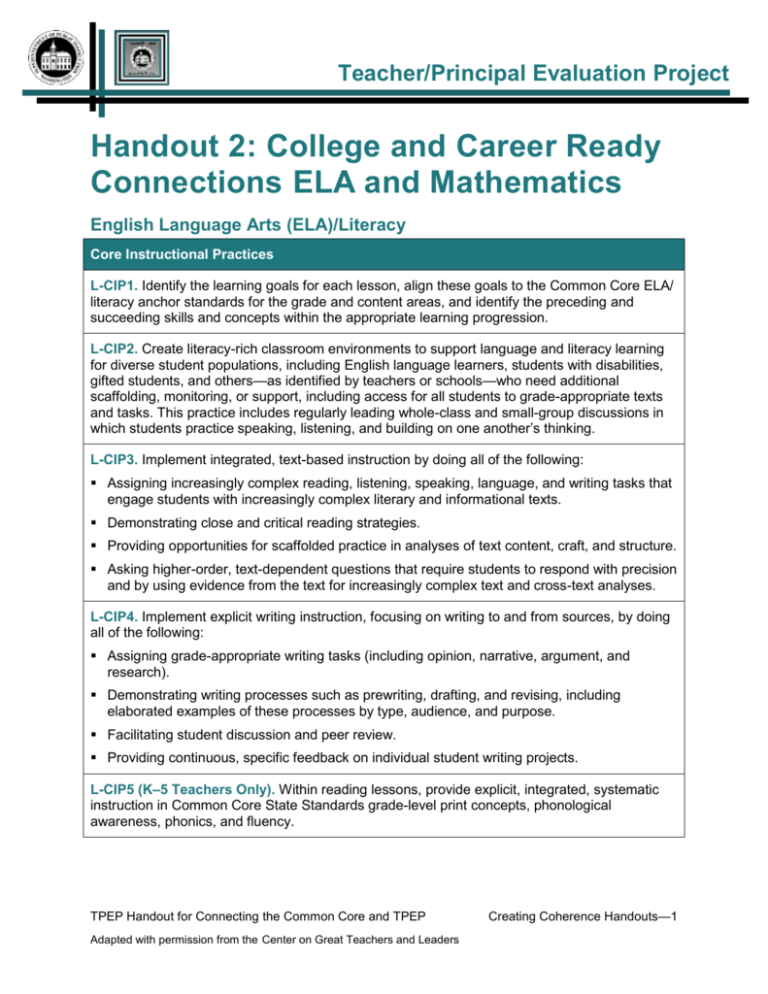
Teacher/Principal Evaluation Project Handout 2: College and Career Ready Connections ELA and Mathematics English Language Arts (ELA)/Literacy Core Instructional Practices L-CIP1. Identify the learning goals for each lesson, align these goals to the Common Core ELA/ literacy anchor standards for the grade and content areas, and identify the preceding and succeeding skills and concepts within the appropriate learning progression. L-CIP2. Create literacy-rich classroom environments to support language and literacy learning for diverse student populations, including English language learners, students with disabilities, gifted students, and others—as identified by teachers or schools—who need additional scaffolding, monitoring, or support, including access for all students to grade-appropriate texts and tasks. This practice includes regularly leading whole-class and small-group discussions in which students practice speaking, listening, and building on one another’s thinking. L-CIP3. Implement integrated, text-based instruction by doing all of the following: Assigning increasingly complex reading, listening, speaking, language, and writing tasks that engage students with increasingly complex literary and informational texts. Demonstrating close and critical reading strategies. Providing opportunities for scaffolded practice in analyses of text content, craft, and structure. Asking higher-order, text-dependent questions that require students to respond with precision and by using evidence from the text for increasingly complex text and cross-text analyses. L-CIP4. Implement explicit writing instruction, focusing on writing to and from sources, by doing all of the following: Assigning grade-appropriate writing tasks (including opinion, narrative, argument, and research). Demonstrating writing processes such as prewriting, drafting, and revising, including elaborated examples of these processes by type, audience, and purpose. Facilitating student discussion and peer review. Providing continuous, specific feedback on individual student writing projects. L-CIP5 (K–5 Teachers Only). Within reading lessons, provide explicit, integrated, systematic instruction in Common Core State Standards grade-level print concepts, phonological awareness, phonics, and fluency. TPEP Handout for Connecting the Common Core and TPEP Adapted with permission from the Center on Great Teachers and Leaders Creating Coherence Handouts—1 Core Instructional Practices L-CIP6. Implement integrated, explicit language instruction by doing all of the following: Emphasizing conventions of standard English grammar and usage for the purpose of meaningful communication. Demonstrating and explicitly explaining examples of standard English grammar and usage, explaining and giving examples of figurative language, and describing word patterns and relationships. Providing multiple opportunities for language practice in small- and large-group discussions. Making connections between students’ informal and home language usage and standard English. L-CIP7. Teach vocabulary by doing all of the following: Regularly embedding grade-appropriate academic vocabulary and domain-specific vocabulary in tasks and assignments. Questioning and leading discussions with individuals and groups of students. Encouraging the accurate use of terminology through guidance and feedback. Demonstrating how to acquire new vocabulary through reading. Providing definitions and examples of academic and domain-specific vocabulary as well as providing access to multiple print and digital sources of definitions. L-CIP8. Demonstrate and guide students in the appropriate and strategic use of technology (e.g., computer software and hardware, the Internet, social media networks) as a set of tools for research, learning, and communication. L-CIP9. (Teachers of Grades 6–12 History, Social Studies, Science, and Technical Subjects). Implement text-based instruction specific to their subject areas by doing all of the following: Assigning tasks that require and guide students to identify, use, and analyze disciplinespecific resources and texts, such as elaborate diagrams and data sets in complex informational texts that illustrate scientific or technical concepts and primary and secondary sources in history. Providing multiple examples of and scaffolded practice for citing specific textual evidence to support analyses of historical, scientific, and technical texts. Explicitly explaining and modeling discipline-specific argument writing by providing scaffolded practice in using precise and knowledgeable claims as well as logically sequenced supporting reasons and evidence. Integrating a variety of media resources as well as providing opportunities for students to analyze and compare a variety of information sources, including data, multimedia, texts, and experiments. L-CIP10. Use questioning and formative assessments to gather evidence of learning throughout every lesson to monitor student learning and assess the degree to which each student has met the learning goals. TPEP Handout for Connecting CCRS and TPEP Creating Coherence Handouts—2 Mathematics Core Instructional Practices M-CIP1. Identify learning goals for each lesson, relate these goals to the Common Core State Standards for mathematical practice and content, and identify the preceding and succeeding skills and concepts within the appropriate learning progression. M-CIP2. Select, modify, sequence, and assign tasks, activities, and problems that are aligned with the lesson’s learning goals and that promote the development of student understanding of the learning goals. M-CIP3. Use rich, problem-based tasks; encourage students to persevere in reaching solutions and to grapple with the tasks. M-CIP4. Embed the mathematical content being taught in contexts that connect mathematics to the real world, as appropriate, and emphasize the use of mathematics in modeling real-world phenomena, where appropriate. M-CIP5. Promote reasoning and sense-making through consistent use of questions such as “Why?” “How do you know?” and “Can you explain your thinking?” Use the answers to these questions to orchestrate classroom discussions in which students explain and defend their thinking and critique the reasoning of others. M-CIP6. Use and elicit multiple representations to support the visualization of mathematical skills and concepts, and make explicit the connections between and among these representations. M-CIP7. Elicit and value multiple approaches to solving mathematical problems, and use these different approaches to facilitate discussions in which the connections between and among these approaches are made explicit. M-CIP8. Emphasize the importance of precise mathematical communication, and connect students’ informal language to precise mathematical terminology and notation appropriate to their mathematical development. M-CIP9. Guide students to select and use appropriate tools and technology to complete mathematical tasks. M-CIP10. Use formative assessments to gather evidence of learning during and at the end of every lesson to monitor student learning and assess the degree to which each student met the learning goals. TPEP Handout for Connecting CCRS and TPEP Creating Coherence Handouts—3
